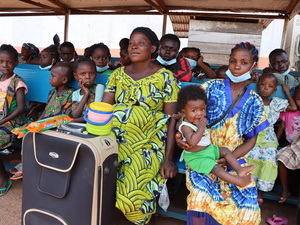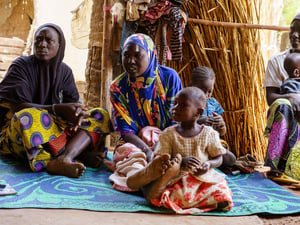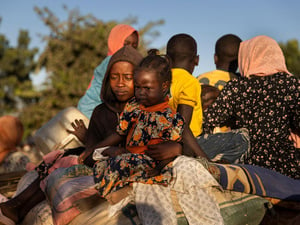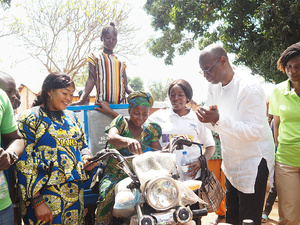More than 10,000 people flee fresh attacks in Nigeria, seek shelter in Cameroon and Niger
More than 10,000 people flee fresh attacks in Nigeria, seek shelter in Cameroon and Niger

Nigerian women forced to flee their homeland work together to build a shelter at the Minawao refugee camp in Cameroon.
YAOUNDÉ, Cameroon, September 2 (UNHCR) - The UN refugee agency on Tuesday reported that more than 10,000 people have fled fresh attacks by insurgent groups in north-east Nigeria and sought refuge in Niger and Cameroon, with some sleeping in schools and churches and children suffering from poor health.
"UNHCR is very concerned that even once they have crossed into Cameroon, they are still being pursued by insurgents and we have already started to relocate some of the refugees to a refugee camp where they can enjoy safer conditions," added UNHCR spokesman Adrian Edwards, briefing journalists in Geneva.
Local authorities say that in the last 10 days at least 9,000 people have arrived in Cameroon's Far North Region and more than 2,000 have sought refuge in Lake Chad islands belonging to Niger, while more people continue to arrive.
The new arrivals fled recurrent attacks in the past three weeks in the Gwoza area in Nigeria's Borno State, before reaching safety in Cameroon. Authorities report that 5,500 refugees have arrived in Kolofata, 3,000 in Kerawa and 370 in Mora, in the Mayo Sava and Logone-et-Chari districts. However, even upon arrival in Cameroon, they are not necessarily out of harm's way. On Sunday, insurgents attacked Kerawa town in Cameroon, forcing refugees and some local residents to flee further inland.
"Our teams have had limited access to the border areas these past weeks because of the increasing insecurity. Despite the volatile situation, we were able to go to Mora over the week end, where we met the new arrivals living in churches and schools and with host families," Edwards said.
.The refugees said everyone had fled and that their villages in north-east Nigeria were now empty. Immediate assistance has been provided by the authorities, NGO Caritas, UNHCR and the host community.
In the Cameroonian border village of Koza, the UNHCR team met with some refugee women. "They told us that when their homes were attacked some days ago in Gokou, in Nigeria's Borno State, their husbands had sent them with their children to hide in the surrounding mountains," Edwards said.
"They later saw heavy smoke coming from their village, which made them fear insurgents had burnt their homes. They waited until night time and had to walk some 30 kilometres to reach Koza. They have had no news of their husbands," he added.
On Monday, UNHCR started to relocate 80 of the new refugees, mainly women and children, from Koza to the refugee camp of Minawao, some 120 kilometres from the border. The camp is hosting some 6,000 Nigerian refugees who were transferred from the border in 2013 and 2014.
In early August, relocation to the camp had been suspended due to insecurity. "Today [Tuesday], security allowing, we will start the relocation of refugees from Mora and Kolofata to the camp," UNHCR's Edwards said.
The total number of Nigerian refugees in Cameroon now stands at some 39,000 according to local authorities, including 19,633 who have been registered by UNHCR.
Insurgents crossed the border last week and attacked villages on the Cameroon side, prompting some 1,700 local inhabitants to flee further inland to villages near the border with Chad. Villagers fled in panic after insurgents slit the throats of three people in a church in Assighassia.
The attackers also burnt down a police and a gendarmerie stations, a local cotton company, and stole some 400 cows. UNHCR is extremely concerned that attacks from insurgents seem to also now target civilians in Cameroon territory.
Niger is hosting more than 50,000 forcibly displaced people who have arrived from Nigeria since May 2013. Inside Nigeria, some 645,000 people are displaced in Adamawa, Borno, and Yobe states, as a result of the violence.
By Djerassem Mbaiorem in Yaoundé, Cameroon, and Hélène Caux in Dakar, Senegal







